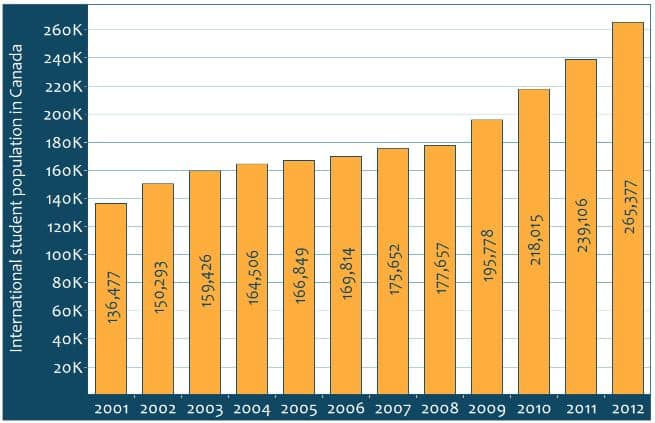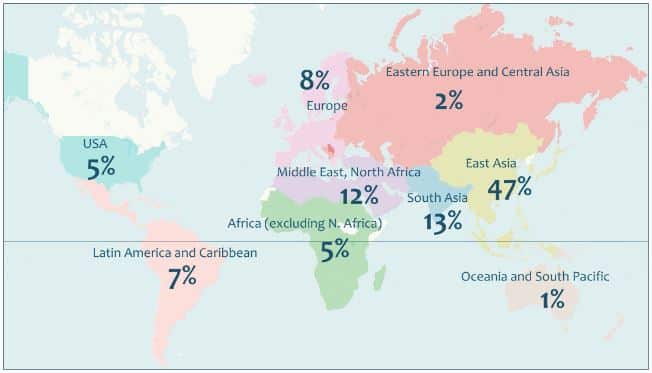Canada’s international student enrolment up 94% over past decade
A new national study on the state of international education in Canada reaffirms the country’s strengthened position as an international study destination. More than 265,000 international students were studying in Canada in 2012, representing an increase of 11% over the previous year and a remarkable 94% increase since 2001.
These are some of the key findings in the second edition of the A World of Learning report from the Canadian Bureau for International Education (CBIE). The report was released this week in conjunction with CBIE’s 47th annual conference in Vancouver.


“South Asia is the region with the highest growth, with a 217% increase in students between 2008 and 2012, primarily driven by the large growth in the number of Indian students in the last four years. These countries, among other high-growth countries such as Nigeria, Brazil, and Vietnam represent key international education markets that add to the cultural and social fabric of Canada and provide linkages for future business, research and diplomatic partnerships.”

More than half (55%) of international students in Canada are enrolled in university programmes, with the balance distributed across other post-secondary institutions, including colleges and trade schools, secondary schools, and “other.” We can understand this last category to include language studies, but the total enrolment in language studies, whether English or French, is understated in this summary for two reasons:
- Citizenship and Immigration Canada (CIC) data, on which the above chart is based, do not include students who come to Canada for six months or less since such students do not generally require a study visa.
- Students enrolled in universities or colleges may also be pursuing language studies at those institutions.
Students’ perspectives on study in Canada
A World of Learningincludes findings from an annual CBIE survey of international students in Canada. The first such survey was conducted in 2012 and this year’s report includes results from the 2013 survey. This year’s survey drew responses from 1,509 students representing 25 institutions. Of those, only about 300, or 20%, reported they had applied to countries other than Canada (for the most part, these students had also applied to institutions in the US, UK, or Australia). This represents a substantial decrease compared to the 2012 survey where 45% of respondents reported applying to countries other than Canada.
More to the point, Canada was the first and only choice for 80% of respondents in 2013.
And it seems that students are happy with their choice as both the 2012 and 2013 surveys found a consistently high level of student satisfaction. “Nine out of ten respondents (91%) were either satisfied or very satisfied with their experience in Canada,” notes the report. “96% of students indicated they would definitely or probably recommend Canada as a study destination.” In terms of the factors that led students to choose Canada for studies abroad, the CBIE survey found:
- Fully 8 in 10 respondents stated that Canada’s reputation as a safe country was either very important (41%) or essential (39%) in their decision to study in Canada. This largely reflects students’ expectations that they would be treated well in Canada, as well as their perception of the country as a welcoming, tolerant society.
- Nearly 8 in 10 (78%) reported the reputation of the Canadian education system - as reflected in international rankings, quality, or prestige of the institution or degree - was very important (47%) or essential (31%) in their decision.
- Affordability was a big factor as well. Two-thirds (66%) of respondents indicated the cost of studying in Canada compared to other countries was either very important (36%) or essential (30%) in their decision.
- Finally, opportunities to work after graduation or to become a permanent resident of Canada were also important decision factors. Two-thirds (67%) said that the prospect of permanent residence in Canada was either very important (30%) or essential (37%). And 68% said that opportunities to stay and work in Canada after their studies were either very important (33%) or essential (35%).
The survey responses were mixed on the question of the role of international education agents. More than half (53%) of respondents said agents played an important role in their decision but, as the report notes, interesting regional differences can be observed in the survey data.
“67% of Latin American students and 72% of European students stated that [a recommendation from an agent was not an important decision factor] compared to a much smaller proportion (22%) of East Asian students. More than 52% of East Asian students said this factor was either very important (36%) or essential (16%) in their decision to study in Canada. Interestingly, South Asian students were split down the middle on this issue with 45% stating it was not important and 41% stating it was either very important (25%) or essential (16%).”
As these highlights reflect, the 2013 edition of A World of Learning contains a wealth of information on the international student experience in Canada, and on many other aspects of internationalisation in Canadian education. We look forward to tracking the country’s progress as a global study destination - as well as the progress and perceptions of its students - in subsequent reports in the years ahead.
















